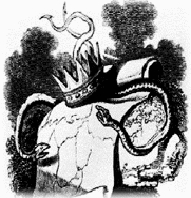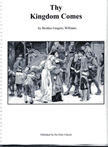Chapter 1. The Kingdom of God

Part 2 A Man as King
“In
those days [there was] no king in Israel, [but] every man did [that
which was] right in his own eyes.” Jud 17:6
The inhabitants of Israel were free to
obey or disobey God. The people called for other men to rule over
them and chose to reject God as they had since the day he took them
out of Egypt. In 1 Samuel, Chapter 8, we see that their decision displeased God and
he warned the people that this desire for a central government with exercising authority, common in most nations, would lead to
terrible oppression, tyranny, and bondage. They would not repent from
that sin. So, Samuel, God’s prophet, appointed the popular man
of the people, Saul, as king over the people in God’s kingdom
on earth.
That was not what God wanted. Things
went from bad to worse as prophesied until a king came to set men
free and restore the Kingdom of God, the right to be ruled by God on
earth.
“Are men the property of the
state? Or are they free souls under God?
This
same battle continues throughout the world?”
Saul was entrusted with an office that
seized the imperium which each patriarch had once enjoyed as
free men in the kingdom of God. “Saul took (from lawkad’,
meaning “to capture, take, seize”) the kingdom (from maluwkah, meaning
“kingship, royalty, kingly office”) over Israel (the
people in whom God was to prevail), and fought against all his
enemies on every side…” The real enemy was in their midst. Saul now possessed the kingship
that should have remained in them.
His reign was called salvation but Saul, in this centralized office of power, did many foolish things. With great power there is great temptation. The power to
command allegiance and obedience; is the power to divide faith and
service, with such power comes great corruption for the ruler and the
ruled. Few on this earth could remain pure under such temptation of
dominion and power.
The high office of government did not
automatically pass to the sons of Saul. Eventually, before Saul was
dead, David would be anointed king. The word “anointed” is translated from the Hebrew word, mashiyach, which, in English, is written “Messiah”. When ever you
see Saul, David, or any king of Israel being called the “LORD’s anointed”, they
are being called the “messiah” in the Hebrew. The Messiah
was simply the anointed King of God’s kingdom on earth. He was
the trustee of God’s dominion on this planet since the son of
Seth, called Enos, when ‘men began to call upon the name of the LORD’ instead of
the name they make for themselves.
When Jesus said, “The time is
fulfilled, and the kingdom of God is at hand”, many people were angry because they did not want to believe in Him or
have Him as King. His policies and doctrines were contrary to what
their kingdom had become. Yet, many called him Messiah, which, in the Greek, would be written Christos. This is where
we get the word “Christ”. Christos means
“anointed” and is a way of saying that Yeshua Mashiyach,
a.k.a. Jesus the Anointed, is the King of Israel, the people who,
God’s kingdom on earth.
This Jesus Christ was and is the
Anointed King of the Kingdom of Heaven on earth, He is the ruling
judge of Judea, which was the remnant Israel, the kingdom where
God prevails.
Of course, unlike other rulers in
other nations, Jesus did not fall to the temptation of ruling over
men. He only came to serve and trained ministers to do the same. They
were not to exercise authority like the other nations, but
truly be servants in a government based upon the perfect law of
liberty, where each man must learn to walk with God, according to
His way. This was the kingdom about which Jesus preached and to which
He appointed His Apostolos, His Ambassadors.
God’s kingdom on earth has been
here from generation to generation. Jesus became its king in spirit
and in truth by His birth and anointing, and sealed that Kingdom in
the innocent blood of His sacrifice. There is a common and
religiously held misunderstanding concerning the phrase the “Kingdom
of Heaven”. God’s kingdom can be called the Kingdom of
God or the Kingdom of Heaven. These two phrases are just the results
of translation from one language to another.
The only author in the Bible who used
the phrase “Kingdom of Heaven” was Matthew and, if we compare the Gospels, we can see that the
phrases were used interchangeably within the different Gospels when
speaking of the exact same incident.
Matthew wrote in Aramaic. In
translating from Aramaic to Greek, the word malkuthach becomes
basileia ouranos, or
Kingdom of Heaven. It actually means a “realm” on the earth. The word ouranos in Plato’s Dialogues is
translated “world”, not a mystical ethereal or spiritual realm called ‘heaven’. The Kingdom of Heaven can mean the Kingdom of the world, since the same word is commonly translated “world” by
Greek scholars.
Ouranos, is from a root word
meaning “to cover, encompass.” The meaning of ouranos includes the “vaulted
expanse of the sky”, from the outer edge of the
atmosphere to the center of the earth. Many other cultures believed
that, if a man actually owned the land as a true and actual dominion granted by our creator, then he owned it from the sky
above all the way to the center of the earth. This is
clearly expressed in the maxim of the Roman law:
“He
owns the land from the heavens and to the center of the earth.”
When someone actually owns land,
holding more than a mere legal title, the maxim in American courts
states, “that a man’s land extends to the center of the
earth below the surface, and to the skies above, and are absolute in
the” ownership of the land. Land owned with a true and actual title by an individual was his
realm, his kingdom. Land owned by a mere legal title does not even
include the beneficial interest of the property in question.
Although the kingdom of God may
include dominion on earth in a godly way, it is far more than that.
In order to understand the Kingdom of God, a.k.a. the Kingdom of
Heaven, this Righteous Dominion of God granted to Adam, sought by
Abraham, taught by Moses, and preached by Jesus, we should examine
its history as presented in the Bible and the Historical record.
God made men free to choose. He may
obey the God of heaven, or he may go out of His presence,
allowing us to reject God and make other men gods over us.
That liberty of choice has a price. The Bible tells us of this
struggle of men to worship the God of Heaven, remaining faithful to
His institutions and principles of law or abandoning God in exchange
for the benefits and protection of men who would be gods. When we
create institution of power and authority with our own hands for our
own benefit at the expense of our neighbor we diminish the liberty
God gave all men.
Patrick Henry, who was often as much
prophet as a patriot, witnessed a preacher flogged to death in
Culpepper, Virginia because the man refused to get a license to
preach the gospel. Today, most churches and ministers participate in
some form of application or registration process with governments
assuming a right of determination that should only be God's to
give. Patrick was moved by the faith of such men who endured agony
and death to maintain a fundamental right. He wrote a speech that is
still remembered by some students of American history in which he
said:
“...
it is natural to man to indulge in the illusions of hope. We are apt
to shut our eyes against a painful truth, and listen to the song of
that siren till she transforms us into beasts. Is this the part of
wise men, engaged in a great and arduous struggle for liberty? Are we
disposed to be of the number of those who, having eyes, see not, and,
having ears, hear not, the things which so nearly concern their
temporal salvation? For my part, whatever anguish of spirit it may
cost, I am willing to know the whole truth; to know the worst, and to
provide for it.”
To fully and honestly examine the
record of God's way we must be willing to look at every aspect of
that record with an open and questioning mind and heart. We must be
willing to suffer the pain of knowing that we may have been deceived.
Every idea we have come to accept as true must be reexamined with a
hope of understanding the whole truth at whatever anguish
of spirit it may cost.
“The
trouble with people isn’t their ignorance - It’s the
number of things they know that just ain’t so.”
Attributed to Mark Twain
Return to Index of Chapters of "Thy Kingdom Comes"

Order the book
Thy Kingdom Comes
http://www.hisholychurch.org/order/materialskingdom.html










